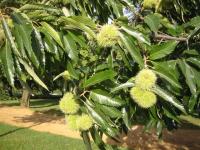27 Jan 2006
Starting Monday- **Top Five Trees for Life Beyond Oil.**
 On Monday begins a new 5 part series at **TransitionCulture**, looking at trees that will be of most use to us as we redesign our communities for the realities of energy descent. I make no claim to it being a scientifically unbiased list, these are trees I have come to love and which I think will be an essential part of our transition toolkits. It’s a ridiculous concept really, as if there are only five trees that will be needed beyond oil peak, but what I am trying to do is to interest and inspire you about some of the less mentioned and more essential ones. I’ll post a new tree every day. Trees are uniquely useful, they build soil, they clean the air, they make rain, they provide habitat, they lock up carbon, they shelter, feed and inspire us, and they can be among the most beautiful things on this earth. In choosing the trees I will be offering to you in this series, I have chosen trees that embody David Holmgren’s principle “Obtain a Yield”. Here you will find no ornamental trees, no purely flowering varieties, all these trees will be useful, usually in a number of ways. Some you will know, some you may not, but hopefully this series will inspire you to find out more, to seek out these trees and incorporate them into your garden, your town, your farm, as well as into your plans for redesigning your communities.
On Monday begins a new 5 part series at **TransitionCulture**, looking at trees that will be of most use to us as we redesign our communities for the realities of energy descent. I make no claim to it being a scientifically unbiased list, these are trees I have come to love and which I think will be an essential part of our transition toolkits. It’s a ridiculous concept really, as if there are only five trees that will be needed beyond oil peak, but what I am trying to do is to interest and inspire you about some of the less mentioned and more essential ones. I’ll post a new tree every day. Trees are uniquely useful, they build soil, they clean the air, they make rain, they provide habitat, they lock up carbon, they shelter, feed and inspire us, and they can be among the most beautiful things on this earth. In choosing the trees I will be offering to you in this series, I have chosen trees that embody David Holmgren’s principle “Obtain a Yield”. Here you will find no ornamental trees, no purely flowering varieties, all these trees will be useful, usually in a number of ways. Some you will know, some you may not, but hopefully this series will inspire you to find out more, to seek out these trees and incorporate them into your garden, your town, your farm, as well as into your plans for redesigning your communities.
 Trees can be the most productive form of land use available to us. We can begin now to plant these, and other trees, in and around our settlements, seeing our towns as potential edible forests. Life beyond the Age of Cheap Oil will require protein that is produced locally with the least environmental impact possible, as well as local fruits, medicines and timber. We can do all of this with a bit of planning and some inspiration.
Trees can be the most productive form of land use available to us. We can begin now to plant these, and other trees, in and around our settlements, seeing our towns as potential edible forests. Life beyond the Age of Cheap Oil will require protein that is produced locally with the least environmental impact possible, as well as local fruits, medicines and timber. We can do all of this with a bit of planning and some inspiration.
Each article will give references as to where you can find out more. I apologise in advance for the fact that as I am writing in the UK and most of my work as a permaculture teacher has been in Ireland, the trees I choose will be suited to this climate. If you are reading this in Algeria or Poland, you might need to do more research into what will suit where you are. I hope you will find it useful. As you will see in the first of these posts, due on Monday, I am a great believer that walnuts will save the world. Perhaps, to return to my previous posting about superheroes, the hero to save the planet will not look like Superman, but will rather be a perfectly formed, freshly-picked, walnut.
Louise
27 Jan 9:50am
Looking forward to those articles on trees Rob -one of my favourite species of the animal and plant kingdoms – and certainly more tolerable and gracious than many specimens in the homo sapiens species. In your list of functions of the noble tree you haven’t mentioned that they act as a water pump – but maybe that’s what you were referring to when you said they help to make rain. Anyway, let’s worship at the altar of the tree, a true beacon of selfless service. One that we all could draw a lot of inspiration from.
Andy Collins
29 Jan 9:50pm
As a frequent visitor to your site, I am looking forward to this as well – once one has read and absorbed the theses of Heinberg, Holmgren et al, the logic points toward some kind of community participation in local agriculture where knowledgeable tree management is a key feature. Once again you seem to have identified a vital area to inform those who, like me, are searching for a an appropriate community response to the challenges ahead. I am sure I speak for many in recording my grateful thanks for passing on your expertise.
Andy C.